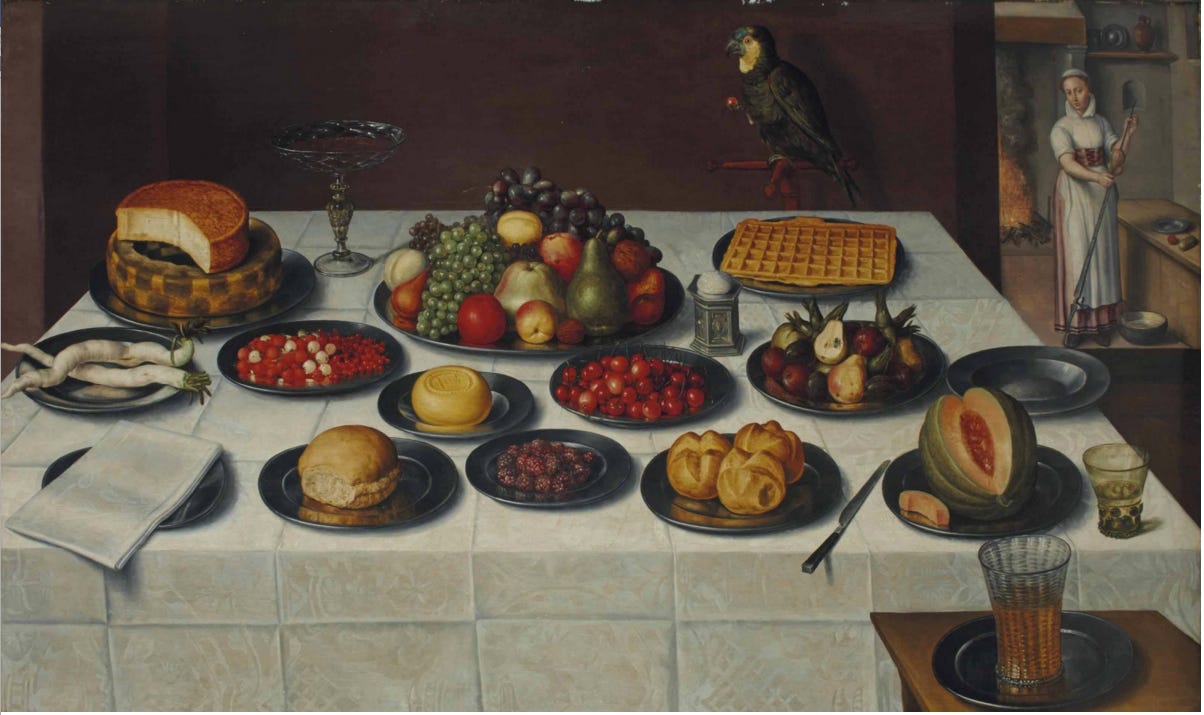Saturday Links
The history of Comic Sans, the novels of Wilfrid Sheed, the Renaissance fruit sleuth, the dark side of Jane Austen, and more.

Good morning! The latest issue of Commonweal marks 100 years of publication for the magazine. I have my differences with the magazine, but the editors have always run an interesting back of the book. In the latest issue, we have George Scialabba on Charles Taylor’s latest book, Phil Klay on Evelyn Waugh (which wasn’t quite as interesting as I had hoped), and Anthony Domestico on the dreary business of journalism in Wilfrid Sheed’s novels, among other tidbits. Here’s a snippet from Domestico’s piece, which is my favorite of the three above:
This familiarity with the world of magazines, its crummy offices and frenetic closing days, sometimes led Sheed to wry affection. “There has never been a cult of personality at Commonweal,” he wrote in a reflection for the magazine, “for which, on the whole, the Lord be thanked and the saints be praised.” It also could lead to a kind of depressive realism. He recognized what it was like to have a piece due and not much to go on. “Max picked up the play again, reluctantly, and resumed the dreary business of accreting an opinion,” he writes in Max Jamison, his 1970 novel about a disillusioned critic. (Is there any other kind?) If Sheed knew the pain of trying to juice eight hundred words out of a bad play, he also knew what it was like to receive the result of such a struggle. “Shabby unsolicited manuscripts concerning which he had to scribble shabby opinions…that was Thursday morning for you,” he writes in the recently reissued Office Politics. That 1976 novel comically depicts life at The Outsider—a small but venerable magazine that, with its simultaneous commitment to, and critiques of, liberalism, shares some DNA with Commonweal. (After the title page, Sheed asserts, “The Outsider resembles no magazine living or dead.” Trust the novel’s details, not the author’s note.)
More:
Sheed is very good on the small details of office life. Office Politics features painfully awkward meetings and even worse after-work drinks. It captures what life is like at the beginning of the week (“Monday morning was no man’s land between home atmosphere and office atmosphere”) and what it’s like at the end of the week (“He would have said the Gettysburg address was too damn long on a Friday”). All of the modern office types are here. There’s the new guy with a confident disposition and no expertise brought in to tidy things up, a consultant avant la lettre. “I’d like to get some idea what you do, George,” this oaf declares. “What’s your end of the operation exactly?” Then there’s the wiseass who thinks he’s above it all while tirelessly battling for a better position. There’s the old-timer who appears kindly but secretly hates everyone. There’s the office manager whose campaign to paint the office a new color is endless. “It seems to me it isn’t right to be influenced that much by anybody, to think about anybody that much,” George says of his boss toward the novel’s end. You don’t have to have worked in magazines to appreciate the sentiment.
But if you have worked in magazines, or if (like me) you just love them, the specifics of Office Politics are even more delightful. The down-at-heel office space, with its “four tiny editorial offices separated by duckboard partitions,” is perfectly imagined, from the water coolers that demand “groveling for a little dribble of warm water” to the staff “sitting under blinking fluorescent lights that nobody got around to fixing.” (I have been to the Commonweal office for lunch and Christmas parties; this is accurate.) The problem with starting to quote Wilfrid Sheed is that it’s hard to stop; the man was constitutionally incapable of writing a stiff sentence.
Congrats to Commonweal on a hundred years of publication. They have run some great pieces over the years, and keeping a magazine in print for a century is no easy task. Bravo.
Keep reading with a 7-day free trial
Subscribe to Prufrock to keep reading this post and get 7 days of free access to the full post archives.



